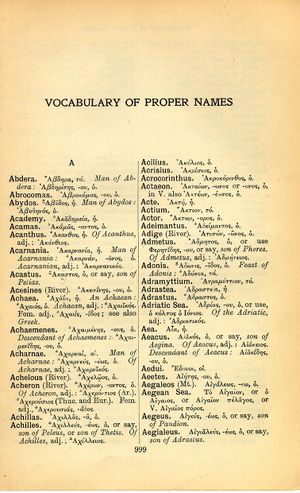Aegeus
Oἷς ὁ βιος ἀεὶ φόβων καὶ ὑποψίας ἐστὶ πλήρης, τούτοις οὔτε πλοῦτος οὔτε δόξα τέρψιν παρέχει. → To those for whom life is always full of fears and suspicion, neither wealth nor fame offers pleasure.
English > Greek (Woodhouse)
Αἰγεύς, -έως, ὁ, or say, son of Pandion.
Latin > English (Lewis & Short)
Aegeus: (dissyl.), ĕi, m., = Αἰγεύς,
I son of Pand on, king of Athens, and father of Theseus, Hyg. Fab. 37, 41; Serv. ad Verg. A. 3, 74; Ov. M. 7, 402 sq.; id. F. 2, 41 al.
Aegēus: a, um (trisyl.), adj., i. q. Aegaeus.
Latin > German (Georges)
Aegeus, eī, Akk. eum u. ea, m. (Αἰγεύς), Sohn des Pandion, König in Athen, Vater des Theseus, Catull. 64, 213. Ov. her. 10, 131 u.a. Hyg. fab. 37 u. 41. Iustin. 2, 6, 14. Paul. ex Fest. 24, 10: Akk. -eum, Hyg. fab. 26: Akk. - ea, Ov. met. 15, 856. Stat. silv. 3, 3, 180. – Dav. Aegīdēs, ae, m. (Αἰγείδης), ein männl. Nachkomme des Ägeus, ein Ägide, Ov.: bes. sein Sohn Theseus, Ov.

